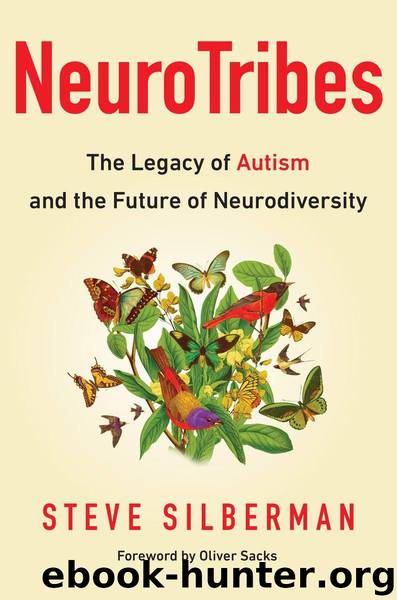NeuroTribes by Steve Silberman

Author:Steve Silberman
Language: eng
Format: mobi, epub, azw3
Publisher: Penguin Publishing Group
Published: 2015-08-04T22:00:00+00:00
He reads and understands books on electronics and uses the theories to build devices . . . He understands the concepts of electronics, astronomy, music, navigation, and mechanics. He knows an astonishing amount about how things work and is familiar with technical terms. By the age of 12, he could find his way all over the city on his bike with a map and compass. He reads Bowditch on navigation. Joe is supposed to have an IQ of 80. He does assembly work in a Goodwill store.
Based on these accounts, Rimland became more open to the idea of a broader autistic continuum. He theorized that the achievements of geniuses like Einstein, Newton, and world chess champion Bobby Fischer were related to the fact that these men “manifested signs—sometimes several signs—of autism.” He ventured, “It may not be too far amiss to suggest that some autistic individuals are incipient geniuses whose eccentricities are so severe and incapacitating that all but minimal participation in the ‘normal’ world is precluded.”
In the midst of a dark age, NSAC laid the foundations of a better future, accomplishing it all with a small but highly committed membership. “So many children . . . needing so much . . . all over the world,” Clara Claiborne Park wrote in the society’s newsletter. “When the hours (or the money) you devote to NSAC seem too much, reflect that the waves you make may wash shores thousands of miles away, bringing hope to families you will never see.”
—
THIS SCRAPPY MOVEMENT MADE its debut on the national stage at NSAC’s First Annual Congress in Washington in July 1969. The theme—reflecting the rebellious spirit of the event and the terminology in use at the time—was “Better Everything for Mentally Ill Children.”
In the past, inviting patients’ families to a conference on autism would have seemed as unthinkable as inviting the “patients” themselves. But this conference, organized by parents, was different: between the formal workshop sessions, speakers and participants commingled in the hallways and the dining room, sharing information on equal terms. Speech therapists, psychologists, and biochemists chatted informally with family members about their research. Most of the participants were too engaged by what was going on around them to pay much attention to the other historical milestone taking place that week: the landing of Apollo 11 on the moon.
The air in the Sheraton Palace was electric as parents spontaneously formed support groups to address issues that weren’t acknowledged in the medical literature, such as the challenges of raising autistic girls, or parenting children who were blind as well as autistic. Rimland and Lovaas were on the speakers list, as was Eric Schopler, a former graduate student of Bettelheim’s at the University of Chicago who had gone head-to-head with him for scapegoating parents. Schopler would go on to launch Division TEACCH (Treatment and Education of Autistic and Related Communication Handicapped Children) in North Carolina, the first statewide autism education program in the United States and the model for many other progressive programs since.
The
Download
NeuroTribes by Steve Silberman.epub
NeuroTribes by Steve Silberman.azw3
This site does not store any files on its server. We only index and link to content provided by other sites. Please contact the content providers to delete copyright contents if any and email us, we'll remove relevant links or contents immediately.
| African-American Studies | Asian American Studies |
| Disabled | Ethnic Studies |
| Hispanic American Studies | LGBT |
| Minority Studies | Native American Studies |
Cecilia; Or, Memoirs of an Heiress — Volume 1 by Fanny Burney(31447)
Cecilia; Or, Memoirs of an Heiress — Volume 3 by Fanny Burney(31038)
Cecilia; Or, Memoirs of an Heiress — Volume 2 by Fanny Burney(30986)
The Great Music City by Andrea Baker(23149)
We're Going to Need More Wine by Gabrielle Union(18127)
Bombshells: Glamour Girls of a Lifetime by Sullivan Steve(13160)
Pimp by Iceberg Slim(13002)
All the Missing Girls by Megan Miranda(12842)
Fifty Shades Freed by E L James(12492)
Talking to Strangers by Malcolm Gladwell(11993)
Norse Mythology by Gaiman Neil(11966)
Crazy Rich Asians by Kevin Kwan(8413)
Mindhunter: Inside the FBI's Elite Serial Crime Unit by John E. Douglas & Mark Olshaker(7903)
The Lost Art of Listening by Michael P. Nichols(6536)
Enlightenment Now: The Case for Reason, Science, Humanism, and Progress by Steven Pinker(6450)
Bad Blood by John Carreyrou(5816)
The Four Agreements by Don Miguel Ruiz(5578)
Weapons of Math Destruction by Cathy O'Neil(5099)
We Need to Talk by Celeste Headlee(4924)
